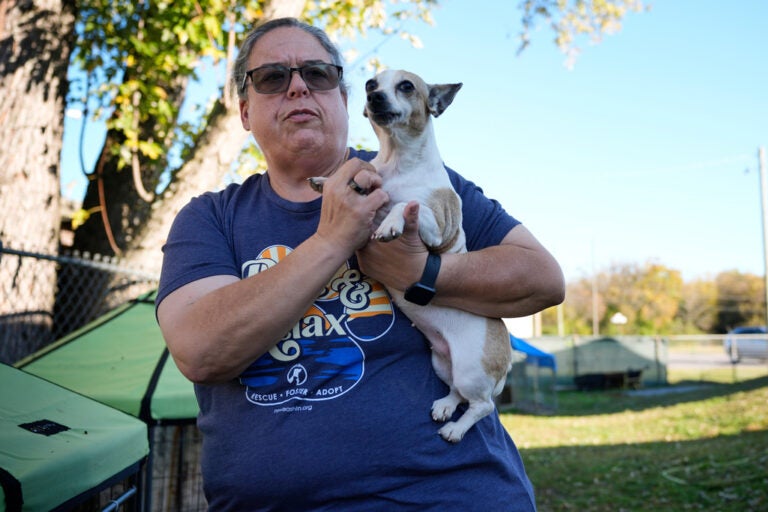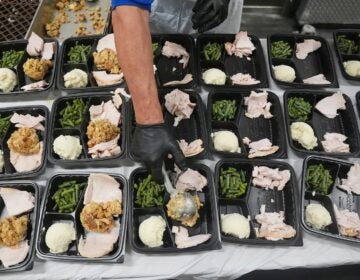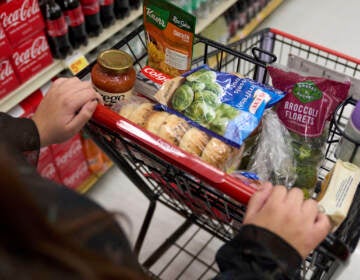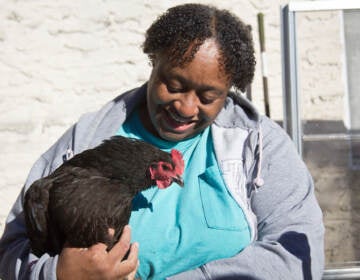Families on SNAP worry about not just feeding themselves but also their pets
Nonprofits say it is common for owners to supplement their pet’s diet with human food purchased using Supplemental Nutrition Assistance benefits.

Angela Chapman, director of New Leash On Life animal shelter, holds an owner surrendered dog at the facility Thursday, Nov. 6, 2025, in Lebanon, Tenn. (AP Photo/George Walker IV)
Sarah Lungwitz has fretted over feeding not just her two teenage daughters with SNAP payments disrupted, but her family’s cat and two dogs.
Help has arrived for now, she says, after an Illinois nonprofit arranged for volunteers to give her a grocery gift card last week to buy food for herself and her pets. It’s among the growing efforts to help struggling pet owners stretch their dollars amid as Supplemental Nutrition Assistance Program payments go out late during a government shutdown that is the longest on record.
“I don’t even make enough money for all my bills let alone groceries,” said Lungwitz, a 46-year-old auto parts store worker who has worried she might have to surrender her cat, Bambi, and two dogs, Spike and Chloe.
The Supreme Court on Friday granted the Trump administration’s emergency appeal to temporarily block a court order to fully fund SNAP food aid payments amid the government shutdown, even though residents in more than a half-dozen states already received the funds. The uncertainty is placing a strain on shelters.
Although SNAP can’t be used for pet food, the food assistance program helps low-income families free up money to purchase kibble. It’s also common for owners to supplement or entirely feed their animals human food that was purchased using SNAP, said Stephanie Hicks, executive director for Care for Pets, the Rockford, Illinois, nonprofit that helped Lungwitz and others. Some volunteers walked the grocery aisles with struggling pet owners.
The Humane World for Animals, formerly the Humane Society of the United States, estimates that more than 20 million pets live in poverty with families. Economic strain is one of the leading reasons animals are surrendered to shelters, spokesperson Kirsten Peek said.
While it is still too early to tell whether that is happening, groups are collecting pet food as shelters worry about a possible surge as the shutdown also leaves hundreds of thousands of furloughed workers without paychecks.
“An increase in surrenders is always a concern when an influx of people fall on hard times,” Peek said.
Finding ways to make pet food last longer
The concerns have one Louisiana shelter considering diverting money away from veterinary care so it can buy pet food. The SNAP delays come at a particularly bad time for the Companion Animal Alliance in Baton Rouge: The shelter recently lost a donor, forcing it to halt a program that distributed pet food to around 200 families each month.
“People are exceptionally panicking. I don’t know what a better word would be,” said Paula Shaw, the shelter’s director of access to care, noting that it was so common for SNAP recipients to give their own food to their pets that the shelter provided information about human foods owners could add to pet food to make it last longer
Offers of pet food and Venmo donations were immediate after Charley’s Angles Pet Initiative in Massachusetts put out a plea on Facebook last week. “We’re expecting, at least in the short term, that there’s going to be a surge” in demand, said Kandi Finch, a groomer who named her nonprofit after a beloved pet.
A rise in families using pet food pantries
That’s exactly what has happened at New Leash on Life, a shelter in Lebanon, Tennessee, outside of Nashville. The number of families using its pet food pantry jumped to 125 in October, up from 75 to 100 in a typical month, said executive director Angela Chapman.
“We’d rather help them with their food than have to surrender a pet,” she said.
In New Orleans, Zeus’ Rescues gave out a ton of pet food in October, double the normal amount, said founder Michelle Cheramie, who said this is the highest demand she’s seen in 20 years.
“It’s heartbreaking,” she said, noting that some people are so desperate they are dumping animals in the shelter’s yard.
Among those seeking help there Thursday was Katie Saari, who is unemployed because of health issues and struggling to set up interviews to get SNAP benefits amid the shutdown. Out of money, she needed food for her two dogs.
“They’re more important to me than I am, so I want to make sure they’re fed first,” she said. “They’re my babies.”
Aware of the problem, many food pantries also stock their shelves with pet food, said Kim Buckman, with Feeding Missouri, a coalition of food banks in the state.
“We do know a lot of people will feed their pets before themselves,” she said. “In some cases, that is their emotional support animal.”
Such is the case for Lungwitz, who said she has PTSD and severe depression. A psychiatrist told her to get a dog because they need walks. That’s how she wound up with her Chihuahua. Her American Bulldog — 80 pounds (36 kilograms) of “pure muscle” — made the domestic violence survivor feel safe. She says it worked, allowing her to venture out into the community and land a job.
But money is so tight that she sometimes seeks help at food banks, including getting doughnuts from one for her 17-year-old daughter’s birthday. “I’m struggling,” she said.
___
Hollingsworth reported from Mission, Kansas.
WHYY is your source for fact-based, in-depth journalism and information. As a nonprofit organization, we rely on financial support from readers like you. Please give today.





